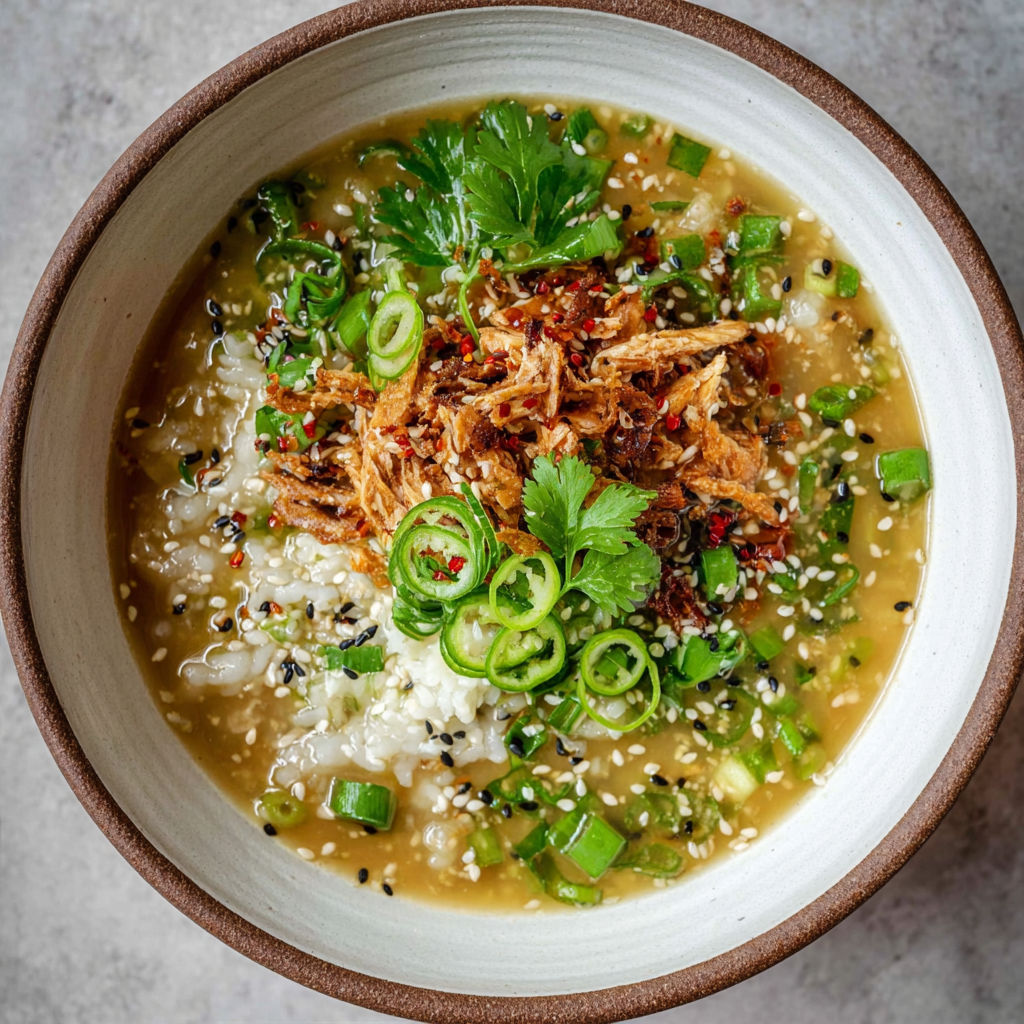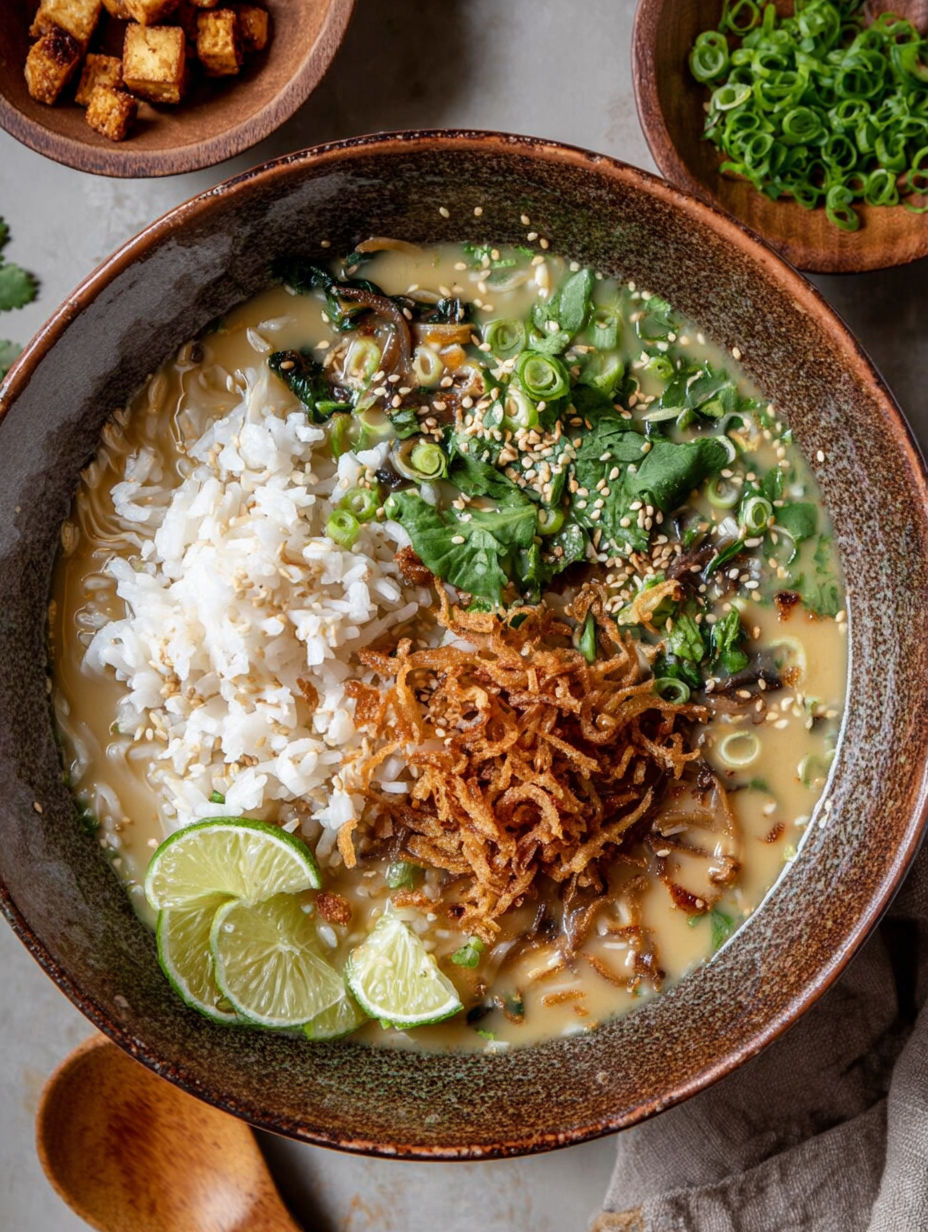 Pin
Pin
This Ginger Miso Brothy Soup with Crispy Shredded Sesame Tofu has become my go-to comfort meal when I need something healing and satisfying. The aromatic broth paired with perfectly crispy tofu creates a balanced bowl that feels both nourishing and indulgent.
I first created this recipe during a particularly nasty winter cold when I needed something both soothing and flavorful. What started as a simple remedy has evolved into one of our family's most requested weeknight dinners.
Ingredients
- Super firm tofu The dense texture is essential for creating crispy shreds. Look for vacuum-packed varieties for best results
- Yellow miso paste Provides a mellow umami foundation. Fresh miso from the refrigerated section tastes noticeably better than shelf-stable versions
- Fresh ginger Use young ginger with smooth skin for the brightest flavor without overwhelming spiciness
- Dried shiitake mushrooms These create incredible depth in the broth. Look for ones with thick caps and visible white cracks on top which indicates more flavor
- Sesame oil A little goes a long way to add nutty complexity. I prefer toasted sesame oil for its more pronounced flavor
- Fresno pepper Adds gentle heat that blooms beautifully in the broth. Choose bright red ones for best flavor and color
- Scallions Both the white and green parts serve different purposes. The whites add savory notes while cooking and the greens provide fresh brightness when finishing
How To Make Ginger Miso Brothy Soup with Crispy Shredded Sesame Tofu
- Prepare the tofu
- Preheat your oven to 425°F while you grate the tofu using the largest holes on a box grater. This unusual technique creates incredible texture. Toss the shreds thoroughly with tamari, rice vinegar, cornstarch, and sesame seeds until evenly coated. The cornstarch is crucial for achieving that golden crispiness.
- Bake the tofu
- Spread the tofu shreds in a single even layer ensuring they have space between them. This allows proper air circulation for maximum crispness. Bake for a full 15 minutes before tossing, then another 5-8 minutes until the edges are deeply golden and crispy. The tofu will continue crisping slightly as it cools.
- Create the aromatic base
- Gently sauté onions over medium-low heat for a full 5 minutes until they begin to turn translucent and slightly golden. This slow cooking process releases their natural sweetness which balances the savory elements. Add ginger, garlic, pepper and white scallion parts, allowing them to bloom their flavors without browning.
- Build the broth
- Add dried mushrooms and water, bringing to a gentle boil before reducing to a simmer. The 15-minute simmer allows the mushrooms to rehydrate completely and release their complex earthy compounds into the broth. The liquid will darken slightly and develop remarkable depth.
- Incorporate the miso
- This critical step preserves the living probiotics in miso. Dissolve it completely in room temperature water with sesame oil before adding to the slightly cooled broth. Never boil miso as high heat destroys both its beneficial properties and delicate flavor.
- Finish and serve
- Use an immersion blender to create a silky smooth broth that carries all the aromatic flavors evenly. The lemon zest and juice added at the end provide brightness that lifts the entire dish. Serve by placing rice in the center of each bowl with broth poured around it, then crown with the crispy tofu.
The dried shiitake mushrooms are truly the secret weapon in this recipe. I once tried making it without them when I was out, and while still good, it lacked that special depth that makes this soup so memorable. My husband actually asked if I had changed the recipe! They create an almost meaty richness that transforms simple ingredients into something extraordinary.

Make-Ahead Options
The broth component of this soup actually improves with time as the flavors meld together. You can prepare it up to three days ahead and store it in the refrigerator. The flavors deepen beautifully, creating an even more complex base. When ready to serve, simply reheat the broth gently while preparing fresh crispy tofu. This make-ahead approach has saved me on busy weeknights when I want something nourishing but have limited time.
Creative Variations
While this recipe is perfect as written, I love how adaptable it is to seasonal ingredients. During spring, I often add tender asparagus spears or fresh peas in the last few minutes of cooking. Summer versions might include fresh corn kernels or cherry tomatoes. Fall calls for cubed kabocha squash simmered until tender, while winter variations welcome hearty greens like kale or chard. The adaptable broth welcomes almost any vegetable addition while maintaining its soothing character.
Serving Suggestions
This soup shines brightest when served in wide, shallow bowls that showcase all the components. I like to place the rice in the center, creating a little island surrounded by the fragrant broth, then arrange the crispy tofu artfully on top. For a complete meal, consider adding quick-pickled vegetables on the side to provide textural contrast and bright acidity. Cucumber quick-pickled with rice vinegar and a touch of sugar is my favorite accompaniment.
The Art of Texture
The contrast between the silky broth, tender rice, and shatteringly crispy tofu is what makes this dish truly special. To maintain these perfect textures, serve immediately after assembly. If you need to hold the components, keep them separate until the last moment. The tofu will stay crisp for about 30 minutes at room temperature, making this doable for casual entertaining. I learned through trial and error that reheating the tofu makes it chewy rather than crispy, so always make that component fresh.

Recipe FAQs
- → Can I make this soup ahead of time?
Yes! The broth can be prepared in advance and stored in the refrigerator for 3-4 days. When ready to eat, simply reheat the broth and prepare fresh crispy tofu. This makes for convenient meal prep while ensuring the tofu maintains its crispy texture.
- → Why add miso at the end of cooking?
Miso paste contains beneficial probiotics that are heat-sensitive. Adding it at the end of cooking on low heat preserves these gut-friendly bacteria and maintains the miso's complex flavor profile. This technique maximizes both the health benefits and taste.
- → Can I substitute the tofu with another protein?
Absolutely! This versatile soup works well with other proteins like shredded chicken, thinly sliced beef, or even tempeh. Just adjust cooking methods accordingly - the broth pairs beautifully with various protein options while maintaining its aromatic flavor base.
- → What if I don't have an immersion blender?
If you don't have an immersion blender, you can either leave the broth unblended for a chunkier texture, or carefully transfer small batches to a standard blender. When blending hot liquids, never fill the blender more than halfway and always secure the lid with a kitchen towel to prevent burns.
- → How can I adjust the spice level?
The Fresno pepper adds a mild heat that complements the ginger. For a spicier version, include the seeds of the pepper or add a dash of chili oil when serving. For less heat, substitute with bell pepper or omit entirely. You can also adjust the amount of ginger to control the warmth of the broth.
- → What are good side dishes to serve with this soup?
This soup works beautifully with simple sides like a cucumber salad with rice vinegar dressing, steamed or roasted vegetables such as bok choy or broccoli, or some pickled vegetables. A side of kimchi would also complement the flavors while adding probiotic benefits.
